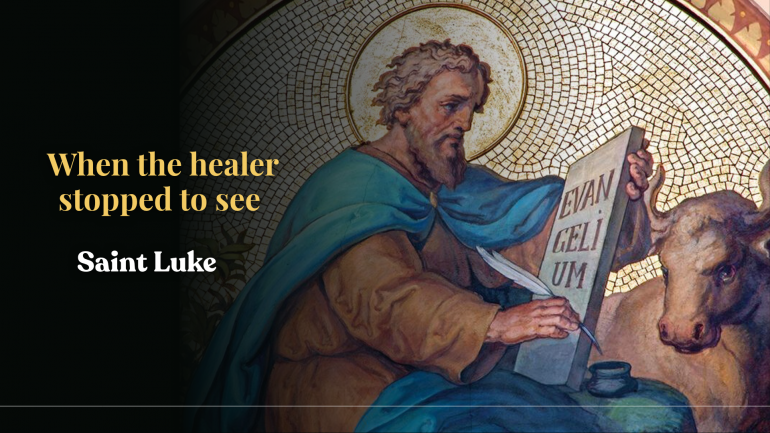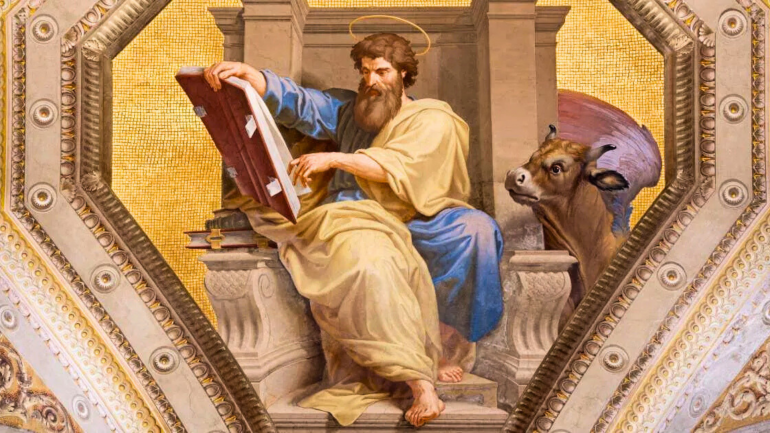When the healer stopped to see

I was twelve when I saw my grandmother kneel beside a homeless woman outside our village church. Most people had hurried past, their Sunday clothes crisp, their minds already on lunch. But my grandmother set down her purse, touched the woman’s shoulder, and asked her name. “Maria,” the woman whispered. They talked for twenty minutes while I stood there, watching something I could not quite name, something like love made visible. I did not know then that I was witnessing the Gospel of Luke lived out in real time.
Luke, the physician who became an evangelist, understood something profound about the human heart. He knew that justice is not an abstract concept debated in courtrooms or written in distant laws. Justice is what happens when we stop. When we see. When we act. His Gospel reads like a love letter to the overlooked, a manifesto for the margins, a declaration that every single person carries infinite worth.
“He has brought down the mighty from their thrones and lifted up the lowly,” Mary sings in Luke 1:52, her voice trembling with hope. These are not just beautiful words. They are a revolution whispered by a teenage girl who believed God could flip the world right-side up. Mary’s song pulses through Luke’s entire Gospel, showing up in every story of transformation, every moment when Jesus touches the untouchable and names the nameless. Luke gives us a Saviour who does not stay comfortable, who moves toward the mess, who sees dignity where others see disposable lives.
Think about the stories Luke chooses to tell. There is Zacchaeus, the despised tax collector perched in a sycamore tree like a child, desperate for just a glimpse of hope (Luke 19:1-10). Jesus does not lecture him about corruption. He invites Himself to dinner. And something breaks open in Zacchaeus, something that makes him give away half his possessions and restore what he stole fourfold. That is what happens when someone truly sees you. That is the justice Luke describes: not punishment, but restoration. Not shame, but transformation.

Or consider the widow who drops two copper coins into the temple treasury (Luke 21:1-4). Jesus notices her. While everyone else watches the wealthy make their showy donations, Jesus sees this woman giving everything she has. Luke wants us to understand that human worth is not measured by what we possess but by the size of our hearts. The widow’s offering represents a radical kind of equality—one where the poor teach the rich about generosity, where society’s values get turned completely upside down.
But it is the parable of the Good Samaritan that cuts closest to the bone (Luke 10:25-37). A man lies beaten and bleeding on the road. A priest passes by. A Levite crosses to the other side. Then comes the Samaritan, the outsider, the one everyone despises. He stops. He bandages wounds. He pays for the victim’s care. Jesus ends the story with a question that still haunts us: “Which of these three, do you think, was a neighbour?” The answer forces us to reckon with our own hearts. Being a neighbour is not about proximity or ethnicity or shared beliefs. It is about stopping when everyone else keeps walking.
I think about that question often now, especially when I am tempted to look away. Last winter, I saw a man shivering outside a small coffee shop, his hands blue with cold. I had somewhere to be. I was running late. But my grandmother’s voice whispered in my memory, and Luke’s words pressed against my chest. I went inside, bought a hot snack and coffee, and sat with him for fifteen minutes. His name was Ramesh. He told me about his daughter in Mumbai, whom he had not seen in seven years. When I finally left, I realised I was not late after all. I was exactly where I needed to be.
Luke’s training as a physician shows in every detail. He notices bodies, their hunger, their pain, their need. He writes about Jesus healing a woman bent double for eighteen years (Luke 13:10-17), restoring her dignity along with her spine. He describes Jesus raising a widow’s only son (Luke 7:11-17), giving her back not just her child but her future, her security, her place in society. These are not just miracle stories. They are declarations that every life matters, that healing and justice walk hand in hand, that compassion is the most powerful force in the universe.
“The Spirit of the Lord is upon me,” Jesus proclaims in Luke 4:18, “to proclaim good news to the poor, to let the oppressed go free.” This is Luke’s vision of human rights, not as political rhetoric but as a divine mandate. It is a call to feed the hungry, welcome the stranger, visit the imprisoned, and stand with the vulnerable. It is the work of a lifetime, done one moment at a time.
My grandmother died eighteen years ago, but I still carry her example. I carry Luke’s stories. They remind me that justice begins with seeing, really seeing, the person in front of me. It begins with stopping on the road, kneeling on the sidewalk, sitting with the lonely. It begins when we ask someone their name and wait to hear the answer.
“Go and do likewise,” Jesus says (Luke 10:37). It is an invitation and a challenge. Luke hands us the healer’s heart and asks us to carry it into a world that is bleeding. So let us stop. Let us see. Let us act. Let us become the neighbours this broken, beautiful world desperately needs.








